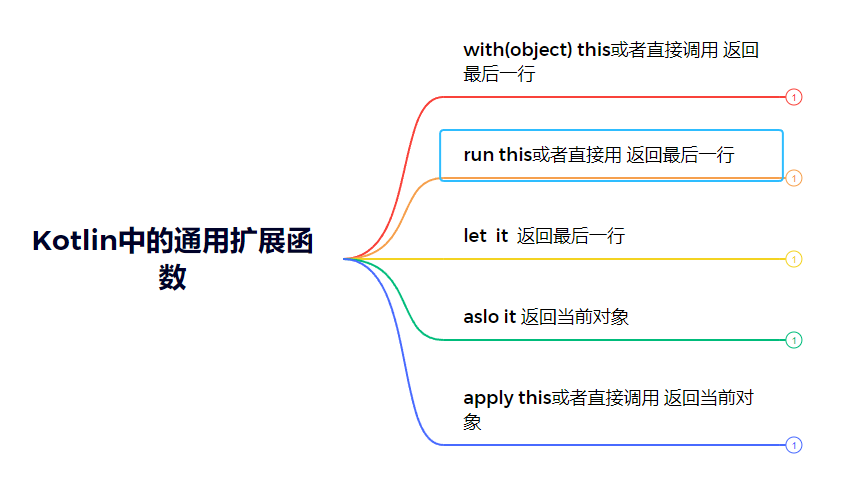Android kotlin中let also apply run with的区别

使用测试代码
1 2 3 4 5 6 7 8 9 10 11 12 13 14 15 16 17 18 19 20 21 22 23 24 25 26 27 28 29 30 31 32 33 34 35 36 37 38 39 40 41 42 43 44 45 46 47 48 49 50 51 52 53 54 55 56 57 58 59 60 61 62 63 64 65 66 67 68 69 70 71 72 73 74 75 76 77 78 79 80 81 82 83 84 85 86 87 88 89 90 91 | class ExtendTest { @Test fun letDemo() { val user = UserInfo() val result = user.let { it.name = "name1" it.age = 20 it.show() 80 } println("result=$result")// 输出结果// name=name1 and age=20// result=80 } @Test fun applyDemo() { val user = UserInfo() val result = user.apply { name = "name1" age = 20 show() 80 } println("result=$result")// 输出结果// name=name1 and age=20// result=User对象 } @Test fun alsoDemo() { val user = UserInfo() val result = user.also { it.name = "name1" it.age = 20 it.show() 80 } println("result=$result")// 输出结果// name=name1 and age=20// result=User对象 } @Test fun runDemo() { val user = UserInfo() val result = user.run { name = "name1" age = 20 this.show() 80 } println("result=$result")// 输出结果// name=name1 and age=20// result=80 } @Test fun withDemo() { val user = UserInfo() val result = with(user) { name = "name1" age = 20 this.show() 80 } println("result=$result")// 输出结果// name=name1 and age=20// result=80 } class UserInfo { var name = "" var age = 30 fun show() { println("name=$name and age=$age") } }} |
let的源码
1 2 3 4 5 6 7 8 9 10 11 12 13 14 15 16 17 | @kotlin.internal.InlineOnlypublic inline fun <T, R> T.lets(block: (T) -> R): R { contract {//它将表明 block 这个扩展方法一定会在这里被执行一次 //callsInPlace(lambda: Function<R>, kind: InvocationKind = InvocationKind.UNKNOWN) //lambda:执行代码块 //kind:上面 block 将会被执行的次数,kind 有四种类型 callsInPlace(block, InvocationKind.EXACTLY_ONCE) } return block(this)}public enum class InvocationKind { AT_MOST_ONCE,//最多执行一次 AT_LEAST_ONCE,//至少执行一次 EXACTLY_ONCE,//有且只有一次 UNKNOWN//未知 默认值} |
contract关键字
contract(契约)是一种 Kotlin 面向编译器约定的一种规则,它帮助编译器更加智能地识别某些需要特定的代码条件,为代码创建更加友好的上下文关联环境。
参考地址:https://blog.csdn.net/HJXASLZYY/article/details/122676634 感谢大佬




【推荐】国内首个AI IDE,深度理解中文开发场景,立即下载体验Trae
【推荐】编程新体验,更懂你的AI,立即体验豆包MarsCode编程助手
【推荐】抖音旗下AI助手豆包,你的智能百科全书,全免费不限次数
【推荐】轻量又高性能的 SSH 工具 IShell:AI 加持,快人一步
· 全程不用写代码,我用AI程序员写了一个飞机大战
· DeepSeek 开源周回顾「GitHub 热点速览」
· 记一次.NET内存居高不下排查解决与启示
· MongoDB 8.0这个新功能碉堡了,比商业数据库还牛
· .NET10 - 预览版1新功能体验(一)